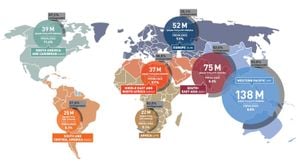Global Fight Against Financial Crime and Fraud Escalates
The international effort to combat financial crime and fraud has reached new heights as nations crack down on various scams and money laundering operations. Recent cases and new training programs highlight how global cooperation and advancements in technology are reshaping the response to financial misconduct.
A prime example includes Daren Li, a 41-year-old dual citizen of China and St. Kitts and Nevis, who pleaded guilty to conspiracy to commit money laundering associated with cryptocurrency schemes. Li admitted to laundering around $73.6 million obtained from victims through fraudulent investment schemes, often referred to as "pig butchering" scams. This term describes how fraudsters establish trust with their targets before persuading them to invest significant sums. Once they have gained their victims' confidence, they disappear along with their money, leaving those betrayed searching for answers.
The U.S. Department of Justice (DOJ) indicated Li directed others to create U.S. bank accounts under the guise of shell companies. These accounts were utilized to convert victim funds to Tether (USDT), one of the most widely used cryptocurrencies, which were then transferred to wallets controlled by Li and his accomplices. Despite operating internationally, Li's case exemplifies how law enforcement agencies coordinate and enforce laws, demonstrating the importance of systematic international collaborations.
The crackdown on Li and others involved showcases regulators' increasing concern over investment scams, especially within the cryptocurrency domain. Organizations like the Commodity Futures Trading Commission have amplified their vigilance, signaling to investors the risks involved when engaging with unverified schemes. Such regulatory measures serve as reminders of potential dangers lurking behind digital investment opportunities.
Following Li’s case, the European arena sees significant action against large-scale VAT fraud networks. A sprawling investigation involving 43 arrests throughout Europe has unearthed criminal activities related to VAT fraud and money laundering, with investigations linking these fraudsters to organized crime groups like the Neapolitan Camorra and Sicilian Cosa Nostra. The European Prosecutor’s Office revealed these individuals might have exploited nearly 520 million euros. Prosecutions point to entities across Italy, the USA, and the UAE, reflecting the global nature of financial fraud.
Laura Kövesi, head of the European Public Prosecutor's Office, stressed the threat posed by organized criminal groups exploiting fraud for significant financial gain. She pointed out the blurring lines between violent crime and "white-collar" crime facilitate criminals with different methods of exploitation. This perspective brings to light how financial crimes are rarely isolated incidents; instead, they are often part of sophisticated networks necessitating collaborative international efforts to break.
Meanwhile, here at home, the United States is ramping up training programs emphasizing anti-money laundering tactics among law enforcement personnel. The U.S. Embassy in Dhaka, Bangladesh, announced the launch of training aimed at enhancing investigative skills needed to tackle financial and cybercrimes. Chargé d'Affaires Megan Bouldin reinforced the significance of combating transnational criminal networks, saying, “Through our joint efforts, we can disrupt these networks and create safer environments for our citizens.” This initiative involves 60 officials from various Bangladeshi agencies and marks the commitment to building partnerships focused on strategic training and knowledge exchange.
Forum discussions around regulating financial technologies continue to spotlight the pivotal role of artificial intelligence and machine learning within the financial sector. Andrew Stucchio from Discover Global Network highlighted how financial organizations are adapting to new challenges posed by cybercriminals using advanced technologies. Through the analysis of transaction data and creation of data-driven rules, companies are detecting unusual activity to safeguard consumers and maintain their confidence.
This integration of advanced analytics is seen as necessary for identifying both threats and existing legal vulnerabilities arising from fraud. With nearly 77 million Americans affected by financial scams over the past five years, as reported by research from PYMNTS Intelligence, financial institutions are urged to play more proactive roles as defenders for consumers. Whitney Case from the Financial Crimes Enforcement Network (FinCEN) reiterated the requirement for banks to comply with the Bank Secrecy Act (BSA), emphasizing the significant oversight placed on these institutions to perform adequate due diligence.
FinCEN is also warning banks about new threats posed by deepfake technologies. Such media manipulation tools, if exploited by bad actors, present new challenges to security protocols, complicity within institutions, and overall consumer trust. Andrea Gacki, FinCEN Director, conveyed the importance of reporting suspicious activities involving our increasingly sophisticated technological warfare.
Overall, the global battle against financial crime looks to benefit from collaborative efforts, whether through local training programs or by improving technological methodologies. Each of these instances reflects the recognized necessity for vigilance from regulatory bodies and financial institutions. Though the face of crime is changing, so are the tools and strategies used to combat it.
This intense focus on tackling financial fraud marks not only significant progress but seeks to uphold trust within financial systems worldwide. Keeping pace with rapid digital advancements highlights the enduring commitment to protect consumers and deter fraudulent activities.
With these collaborative dimensions becoming increasingly prominent, it remains evident: the fight against financial crime is far from over. Continuous adaptation to new fraud mechanisms will be key as authorities and institutions persistently redefine their strategies to safeguard citizens across the globe.



